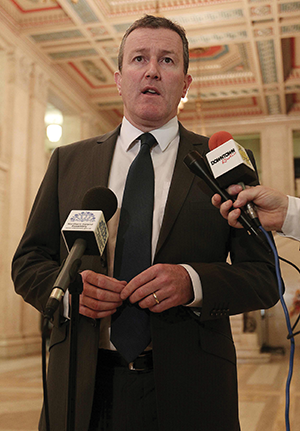Politics of the economy
 Sinn Féin MLA and former Minister Conor Murphy talks to Owen McQuade about the economy, north/south cooperation and the devolution of fiscal powers.
Sinn Féin MLA and former Minister Conor Murphy talks to Owen McQuade about the economy, north/south cooperation and the devolution of fiscal powers.
Sinn Féin is now in a unique position as the largest nationalist party in Northern Ireland and at the same time riding high in the polls in the Republic. When asked his view on the state of the party Conor Murphy replies: “Firstly, we are an all-island party so we organise on a national basis, that’s what our party structures are built around. But obviously we contest elections in two different jurisdictions. That creates a different dynamic – in the south, we are clearly a growing party. We’ve been having significant growth in terms of the last general election, and then the European election and the council elections.”
The party’s growth is reflected in the fact that there are now Sinn Féin mayors in the cities of Cork, Dublin, Belfast and Derry, which Murphy sees as “symbolic and quite a remarkable achievement.”
“It’s the first time in Cork since the 1920s, it’s the first time ever in Dublin, that we’ve had a mayor. They are all very positive signs of a party that is growing, that is moving.”
North of the border Murphy acknowledges things have been “more static than we would like.” He says that the Westminster election was “reasonably good” for the party against a backdrop of a low level of confidence in politics “because of the difficulties in this institution. And so, it is harder to motivate people to come out and say they are voting for a specific project of change.”
“Nonetheless, we had a good election. We were very disappointed to lose Fermanagh/South Tyrone. It’s always a knife-edge constituency, but it is still disappointing because somebody of the calibre of Michelle Gildernew is a terrific asset to the party.”
Reflecting on the overall election results: “I think in the circumstances we were faced into, probably a little sense of despair, in terms of what the British government are doing among the broad population. Unionism getting its act together in various constituencies to try and maximise its vote, [and] a divergence of opinion among nationalism. Nonetheless it was a reasonably good election in those circumstances and we have to build on that.”
Looking to the forthcoming election in the Republic, Murphy is optimistic: “We’ve always felt that our real figures in the polls were probably more in the high teens than the low to mid 20s which sometimes the polls predict us to be. If that was the case, replicated in the general election, I think we would significantly increase our number of TDs. We’re on course for a decent result in the south.”
Although both Sinn Féin and the independents are doing well in the polls he doesn’t see the potential for an ‘alternative left’ government. “But if that does happen to be the case then I think we would very much want to be part of that. I don’t see any appetite whatsoever within the party for getting into an arrangement with either Fianna Fáil or Fine Gael.”
The economy
Murphy admits to being somewhat frustrated by the debate on welfare reform, which he says should be viewed through a wider lens of the economy as a whole. “Politics in the North has been frustrating. Peter Robinson’s letter from America was the start of a three year election cycle in which no business was going to be done. Making progress on issues which required both of us to give and take was reduced.
“Allied to that we have had the impact of £1.5 billion worth of cuts. You then have financial pressures piling on top of political pressures.”
“It is unfortunate that the debate has narrowed around the issue of welfare because it is only one small part. The real problem that we have is that the budgets have been cut so badly, with the prospect of other cuts. So we have dealt with £1.5 billion worth of cuts, we did manage with difficulty to agree a budget for 2015/16.
“Outside of the Stormont House Agreement, the British government has already cut a full £38 million off that, with more cuts to come. This institution is at breaking point in trying to cope with that.”
“We’ve been trying to make a clear case to the British government in relation to the impact of all of that. The difficulty I think is trying to get a unified approach from the Executive – whether they [the other parties] just agree with the austerity approach or they don’t see there’s any point in fighting it or they have other private arrangements with the British government in terms of not creating problems from around these issues. But for whatever reason, it has been very difficult to get all parties onto the same script in terms of presenting the challenges.
“And to get parties onto a similar script as in Scotland and Wales, particularly Scotland [is] leading the charge on this. If we have any prospect of making the British government change course, then it is in as much numbers as we can muster.
On the issue of more fiscal autonomy for Northern Ireland and indeed any economic issues north of the border Murphy appears to the main spokesperson, and indeed thinker, for Sinn Féin. He has been talking to business organisations, trade unions and the community and voluntary sector and says that there is a “strong sense of the impacts of these cuts.”
He says a package is needed to protect the Executive from further cuts. “To have a workable and sustainable budget we need fiscal powers to allow us to affect and stimulate our own economic recovery and if we get fiscal powers we have to retain the benefits of the use of those powers.”
On the devolution of fiscal powers he observes: “We have come from a position of Sammy Wilson saying I don’t want any more powers because I am a unionist to a position where the DUP are willing, on the basis of the Smith Commission for Scotland, to look at the type of powers Scotland is advocating.”
On the debate on more economic powers, Murphy sees a parallel with the debate before the devolution of policing and justice, with some saying that the Assembly was not mature enough to handle policing and justice. “Policing and justice has been one of least contentious issues the Assembly has had to deal with.”
“We have a Department of Enterprise, Trade and Investment that has no economic powers. It is basically there to attract business.”
When questioned about the premise that Sinn Féin lacks economic expertise, Murphy is robust in his response and shows obvious frustration.
He quotes a difficulty in getting access to economic figures in Northern Ireland. Murphy says that Sinn Féin has to rely on “people in other departments” for economic data, tax return potential, or social security spend figures. “That makes it difficult to speak with confidence on such figures.” When you go on a radio show and mention a figure for corporation tax, it is met with a response: No, no, the finance Minister, who’s opposed to corporation tax, told us it was £400 million. Is that the actual figure or something inflated for political purposes?”
“That’s not an excuse. We do need to upskill our competence and our capacity to be able to speak on and debate [economic] issues.”
“The debate here is around public finances. It is not around the economy because we don’t have economic levers.” He also makes the point that the debate around devolution of fiscal powers is informed by “questimates for Treasury. Nobody knows what the actual deficit is. There’s a dispute around the figures.”
“The real difficulty is that we try to present an alternative economic argument. If you ask the DUP, UUP and SDLP their economic policies are basically whatever the British Government decides or whatever business decides is a good thing. They don’t develop their own economic policies and they don’t challenge the norm and are therefore never put under scrutiny. They don’t get asked on Nolan, as I did some weeks ago, to prove that they are economically literate.”
“We are not talking about making Northern Ireland viable. No one considers it to be economically viable. If you are talking about bridging that gap you have to look at it in an all-Ireland context with the cost of partition and duplication. The question is can the island sustain itself? Not, can the six counties sustain itself economically? This debate is stifled by the other political parties, and by the media, who don’t want to discuss an all-Ireland economy.”
North/South
Moving onto North-South cooperation, when asked has the Good Friday Agreement delivered better cooperation between both jurisdictions, Murphy replies: “The all-island bodies were limited in their scope when they were agreed.”
“With the Executive going into cold storage for five years, the north/south bodies were just maintained in a kind of ‘care and maintenance’ basis. When I was a Minister working with them, I was very frustrated by the formality of it all. It was all about scripts being agreed. It was almost like groundhog day meeting after meeting going over the same stuff.” He does acknowledge that “some progress was made in areas like health.”
The lack of progress on North/South issues “has been very frustrating but if we are facing a long period of austerity people need to start looking at alternatives and what are the alternatives for a small island of six million people.”
“If Greece comes out of the eurozone there will be a devaluation of the euro and that’s bad news for businesses in the north. There is more [cross border] trade now but I don’t think enough effort was put into InterTradeIreland. I think that from a North/South business perspective, the DUP having had control of DETI for eight years has been a dead hand in terms of development.
“There has also been a lack of enthusiasm from the Dublin Government. They had been completely hands-off for a period of three to four years to such an extent that things nearly collapsed. They have finally woken up to the fact that we still have problems here and they have been more engaged over then last year than in the three to four years previously.”







